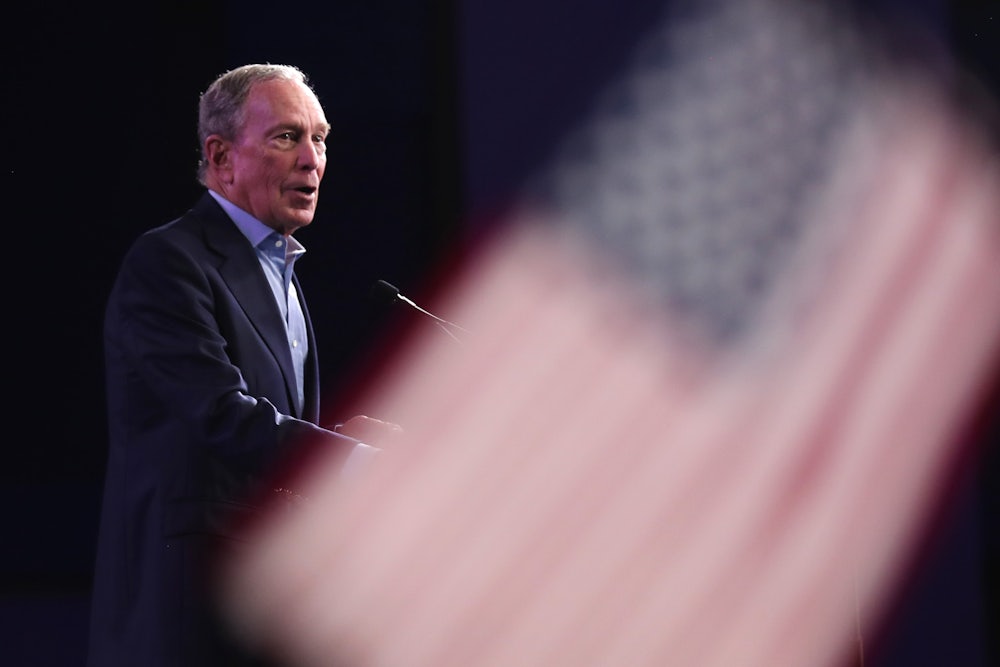After a predictably poor showing on Super Tuesday, Mike Bloomberg ended his presidential campaign Wednesday morning. It was a short and expensive endeavor, kind of like Bloomberg himself. (Thank you.) The former mayor of New York City entered the race on November 25 and poured more than $200 million into his campaign by the end of December. He rapidly opened 200 offices around the country and paid his staffers sometimes double the rates being offered by other campaigns. He flooded every cable, Roku, and YouTube channel with increasingly invasive ads. He beamed his image, several stories tall, into Times Square.
Throughout the course of his three-month run, the multibillionaire spent more than $560 million on ad buys. That doesn’t include how much he spent on staff, office space, travel, and internal polling. To put this in perspective, from the day he announced his campaign to its end, Bloomberg was shelling out $233,333.33 every hour on those godawful ads alone. (If you’d care to break down both the math and your self-esteem even further, that’s basically $3,900 every minute.)
$500m is 0.8% of Bloomberg's net worth. So for the typical American household with a net worth of $97k, his Presidential run was like blowing $800 on a vacation that turned out to be not that fun.
— Ezra Levin (@ezralevin) March 4, 2020
Now you might think to yourself: Imagine what Bloomberg’s money could have meant had he spent that half-billion chunk on down-ballot races in red and purple states. It’s a nice idea, but it’s kind of beside the point. No one should have that much money or influence in the first place, but protecting that system is precisely why Bloomberg ran. Sure, it was an exercise in humiliation. It was also an investment in himself.
Bloomberg is the tenth-richest person in the entire world, his fortune hovering around $64 billion. It has been stated numerous times now, but a single billion on its own is an inconceivable amount of money:
If you worked every single day, making $5000/day, from the time Columbus sailed to America, to the time you are reading this tweet, you would still not be a billionaire, and you would still have less money than Jeff Bezos makes in a week. No one works for a billion dollars.
— Jeremiah Flood🌹 (@_Floodlight) October 7, 2019
Bloomberg has that many times over. He used his money and influence over the press to attempt to whitewash his past as the racist mayor of New York City in order to remind everyone how insanely rich he was—and ensure he could stay that way. Bloomberg’s campaign was an act of self-preservation, an attempt to block or at least stall the progressive candidacies of Bernie Sanders and Elizabeth Warren, both of whom have championed wealth taxes that would undoubtedly sap some of his enormous fortune.
The last three months should have been a wake-up call for how badly reforms like publicly financed campaigns and wealth taxes are needed to prevent future Bloombergs from diving into these races whenever they please. Instead, because wealthy men like Bloomberg have designed and morphed America’s electoral and campaign-finance system, his candidacy was treated as completely normal out of the gate.
And sure, it wasn’t all bad. There was his evisceration at the hands of Elizabeth Warren, a few good jokes about how short and unlikable he is, a renewed sense of interest in his racist and misogynist past and present. But watching his attempt at straight-up buying the White House come to an end on Wednesday portends a bleak future: He could have kept spending forever, so money wasn’t the question. Instead, he dropped out because he likely felt it would help consolidate support around Joe Biden, a candidate who doesn’t have the same Scrooge McDuck or Mr. Burns vibes as Bloomberg but still shares a common interest. And if that pays off in November, as my colleague Jason Linkins has suggested, burning through millions every single day will have been money well spent.
